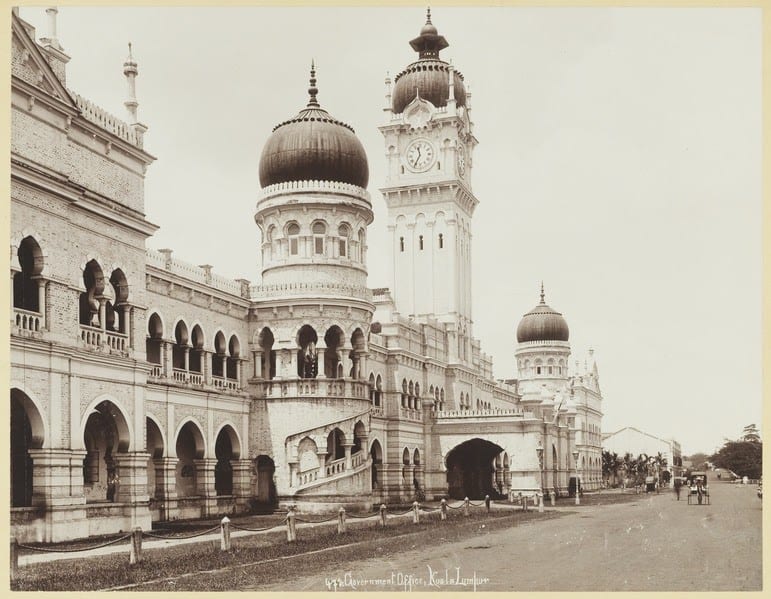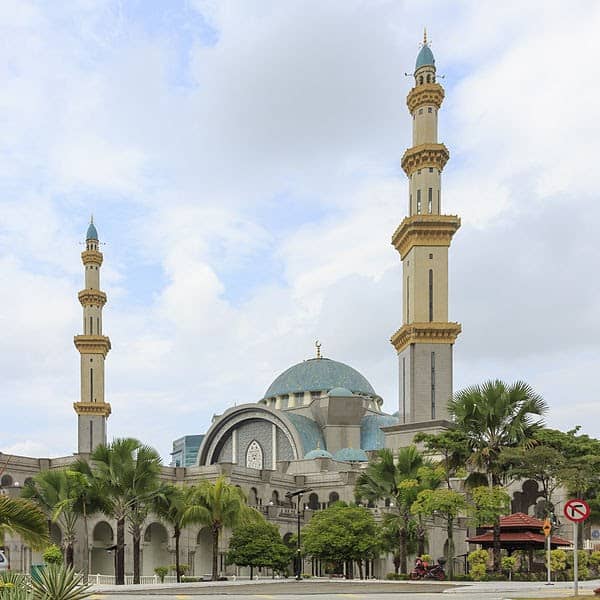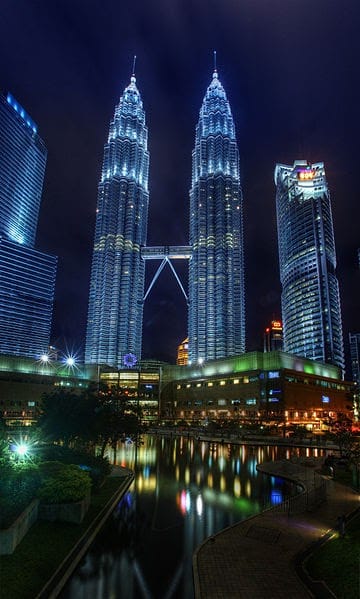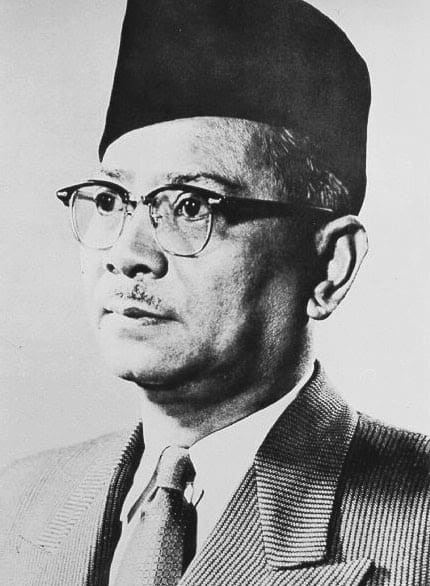A single election can have many impacts, but one in particular unmasked a deep, controversial issue based on ethnic tensions. The 1969 general election in Malaysia sparked a horrific outbreak of violent rioting and brutal conflict between two struggling forces. What came to be known as the “13 May Incident” resulted in at least 196 civilian deaths in Kuala Lumpur.

Former Foreign Service Officers David Brown and Alphonse La Porta both served as political officers in Kuala Lumpur and provided first-hand accounts of the environment leading up to, during, and after this pivotal election.
The 1969 election resulted in a shift of representational power within the Malaysian Parliament. The Alliance Party, representing the majority Malay population, lost seats to the newly established opposition Chinese parties, the Democratic Action Party, and the Parti Gerakan. While the Chinese are a minority in Malaysia, they hold substantial socio-economic power, and as a result have steadily increased their influence both economically and politically. The political victories of these Chinese political parties sparked race riots based on deep-seated ethnic tension dating back to Malaysia’s British colonial rule.
Background
Racial conflict is not new to Malaysia, a country composed of approximately 62 percent Malays, 21 percent Chinese, and 6 percent Indians. British colonization constructed this dynamic, which persisted after Malaysia’s independence in 1957. Over time, the Chinese population, which concentrated in urban areas such as present-day Singapore, established itself as an economic force in Malaysia. The resulting gain in Chinese political influence upset the majority Malay population, which eventually expelled Singapore in 1965 in an effort to govern without the growing Chinese opposition. While this addressed the prevailing political concern at the time, it did nothing to confront the ethnic and religious tensions that still brewed in the rest of Malaysia. By the 1969 election, Malaysia yet again confronted the growing influence of its minority population.
The election ultimately set fire to tensions that had been simmering for years. Issues that led up to the election included the incentive to institutionalize the supremacy of “Malaysian Malaysia” over other ethnic groups and to maintain the power structure of Malay political dominance. There had been various conflicts prior to the 1969 election that dealt with similar issues. With increasing Chinese economic power, many Chinese-Malays felt that they deserved more representational power in government. When the election resulted in the increase of seats for the opposition Chinese parties, it upset the ruling Malay Alliance Party, revived a long-standing grudge, and inflamed ethnic tensions. A parade that was meant to celebrate the election results led to the brutal rioting and violence between ethnic Chinese and Malay.
David E. Brown served as chief of the political section in Kuala Lumpur following the 13 May Incident. He describes the state of Kuala Lumpur at the time he arrived. Brown also delves into the issues of Vietnamese “boat people” refugees coming into Malaysia following the Vietnam War and how the Malaysian government dealt with this refugee issue.
Read David E. Brown’s full oral history HERE.
David E. Brown’s interview was conducted by Charles Stuart Kennedy on May 20, 2015.
****
Alphonse F. La Porta served as a political officer in Kuala Lumpur between 1972–1975. La Porta also describes the situation of Kuala Lumpur between the Chinese and Malay population, as well as the Indian population. He includes the religious dynamic within Malaysia.
Read Alphonse F. La Porta’s full oral history HERE.
Alphonse F. La Porta’s interview was conducted by Charles Stuart Kennedy on February 11, 2004.
Drafted by Melissa Cooper
ADST relies on the generous support of our members and readers like you. Please support our efforts to continue capturing, preserving, and sharing the experiences of America’s diplomats.
Excerpts:DAVID E. BROWN—Bien Hoa, Vietnam, Political Section Chief (1984–1987)
“There was inevitably a lot of ethnic tension.”
Ethnic Tensions: Q: What was the situation in Kuala Lumpur or Malaysia when you arrived?

BROWN: Well it was absolutely fascinating. Malaysia had been a British colony, actually four British colonies: peninsular Malaya, Singapore, and Sabah and Sarawak in north Borneo. These colonies had been amalgamated through general agreement of the leaders of those places as part of the independence arrangements with the UK in 1963. The federation came apart within two years with Singapore’s secession, which had the result of cementing Singapore as a Chinese dominated city state, and the rest of what had become Malaysia as a state dominated by Malays and other indigenous peoples but with, however a substantial Chinese and Indian minority, roughly 1/3 Chinese and 10-11% Indian. There was inevitably a lot of ethnic tension.
Chinese and Indian immigration had been encouraged by the British to provide a source of reliable labor for the tin mines and rubber plantations and so forth that were developed in the colonial era. Certainly the Chinese still were the most dynamic part of Malaysia’s economy. Further, by 1984 the first generation of political leaders, Tunku Abdul Rahman and his successor, Hussein Onn, had been replaced by a rather more polemical bunch of people who had as their cardinal policy the elevation of the Bumiputra. Bumiputra means ‘sons of the soil’ and of course this is a term meaning the Malays and other indigenous folks. Mahathir Mohammed was then the prime minister. He had been in office a couple of years, and had launched a draconian affirmative action program favoring the Malays.
I should mention that only four years earlier there had been very bloody race riots, particularly in the capital, Kuala Lumpur between Chinese and Malays, after which the Chinese did not presume any longer to share political power. They were intent, however, on maintaining their economic position and their status, at least behind the scenes, as an important part of the Malaysian community. There were a couple of other officers and subsequently also a junior officer also in my section and they kept a close watch on domestic affairs, particularly this new brand of federal ethnic politics. We were also concerned by the systematic conversion of Malaysia’s judiciary into a docile instrument of the regime.
“. . . that there was an awful lot of angst and, smoldering beneath the surface, a lot of tension.”
So yes, there was plenty to do in Kuala Lumpur at that time. It was socially or politically a strange time because while there were a lot of friendly relationships between the U.S. and Malaysia’s traditional elites, the new bunch, the Malay firebrands who were out to remake the political structure, viewed American diplomats with considerable suspicion. They certainly kept the U.S. at arm’s length.
I guess you couldn’t work in Malaysia without being conscious that while there was an elaborate and very substantial and sincere effort made by members of all three major ethnic communities to maintain a tolerable social peace, that there was an awful lot of angst and, smoldering beneath the surface, a lot of tension. The question which we asked ourselves in order to move the reporting along was “whither Malaysia?” Was it going to end up some day like Singapore, or instead go the way of Lebanon or other multi-ethnic countries which simply could not make a go of it?
“They’d cross by night in pirogues, small boats, and be the subject of considerable argument and some friction between Malaysia and Indonesia.”
Vietnamese Political Refugees: Another important object of U.S. interest in Malaysia was assistance to political refugees from Vietnam, the so-called boat people who had been arriving on Malaysia’s northeastern seacoast in great numbers. Those who survived the perilous journey across the Gulf of Siam to Malaysia were not really welcome. The Malaysian government worried that it might be saddled with another hard-to-digest minority. Under pressure from the UN and western countries, Kuala Lumpur had agreed to give these Vietnamese temporary refuge in very tightly supervised camps and facilitate their selection for resettlement in countries that were willing to take them.
For me, refugee resettlement was a backup brief. My good friend, David Walker, was posted to Kuala Lumpur as the refugee attaché. He managed most of the operational contact with Malaysian officials and also the hard work of screening refugees for possible resettlement in the U.S. We had our standards; not everyone could qualify. Basically they had to demonstrate some reason why they should be accepted. Generally, they already had a real connection with the U.S. We were not much interested in accepting folks who were simply opportunistic, those who fell into the category of what we generally called economic migrants. Those people generally tended to be Vietnamese of Chinese ancestry. We weren’t too sure that many were in fact bona fide political refugees. It became evident as time passed that the new communist regime made life for the so called entrepreneur class in Vietnam virtually impossible. In retrospect, most were just as worthy political refugees as those of pure Vietnamese stock.
Q: At that time was there much migration, legal or illegal, between Sumatra and Malaysia?
BROWN: There was a problem. It was all almost undocumented. Many cases were seasonal. Poor people would cross over to work on the oil palm plantations and in other jobs. They’d cross by night in pirogues, small boats, and be the subject of considerable argument and some friction between Malaysia and Indonesia. There were other things that were equally irritating. That included the beginnings of substantial cross Malacca Straits environmental pollution from the burning of fields for land preparation practices in Sumatra. It is still a problem today. And at that time, there was an alarming rise in piracy in the Malacca Straits, which is one of the chief reasons that the U.S. targeted Malaysia as an object of naval cooperation and some Coast Guard cooperation as well. Obviously, we had a real interest in seeing their forces get out of port and become increasingly more effective in what is now called “maritime awareness and interdiction capability.”
“There was a new Malay government which was aggressively pursuing a pro-Malay affirmative action program.”
The Little Dragons: Q: I may be repeating myself, but how was Malaysia when you left. They made quite a turnaround from being a not very motivated world force into one of the little dragons. How did that come about?
BROWN: While I was in Malaysia, it was taking off as an assembler of increasingly high tech devices. Intel was the biggest American firm there, but there were lots of others particularly in the area around Penang City. It was really thriving. As I mentioned earlier, there was a new Malay government which was aggressively pursuing a pro-Malay affirmative action program. Which was not regressive at all in the sense that rather than penalize everybody else, the objective was to bring Malays, who were largely country people into the modern, urban workforce to participate in the hi tech foreign investment driven surge. As you said, Stu, that brought Malaysia in the course of ten or twelve years into the ranks of the so-called “little dragons.” I was there at the beginning and sensed that it was likely to be a permanent thing. If my friends who tell me about Malaysia these days are correct, the country now has a problem with crony capitalism. A lot of the newly enfranchised bumiputra, that is, the champions of affirmative action for the Malay majority, have become very rich people based on close links to the government. That is a problem these days for the economy that wasn’t that obvious in the time I was there.
****
ALPHONSE F. LA PORTA—Kuala Lumpur, Political Officer (1972–1975)
Malaysian Politics: Q: Well, let’s look at Malaysia at this time. Could you sort of describe the political situation, the government that you’d be dealing with?
LA PORTA: The prime minister when I arrived was Tunku Abdul Rahman, who was known as the father of Malaysian independence in 1963. Between 1961 and 1963 there was that strange federation with Singapore in which neither the Tunku, as he was known, and the prime minister of Singapore, Lee Kuan Yew, were very comfortable with each other. Malaysia peaceably went its own way in 1963. Tunku Abdul Rahman represented the Malay aristocracy that had been nurtured, if not coddled, by the British during their nearly 100 years of control. He had a very patrician view of governing and was trusted by the Chinese and Indians, but not by Malay “Young Turks” who wanted to assert their political primacy. Fortunately the British left a number of very strong institutions, one of which was the civil service. They were very good, and they are very good to this day. Secondly, the British left a strong educational system with a growing university system. Thirdly, they imparted a sense that merit counts in that society, whether a meritocracy in government service, the private sector, the educational system, or whatever.
“The British ultimately didn’t do the country any favors by having this compartmentalization.”
Q: Wasn’t there a problem, I don’t know the area, but what I gather there’s this gap between the Chinese who always, I mean, even in our country, are extremely hard working and the Malays who one thinks of as being more laid back. In a meritocracy I would think this would cause a problem.
LA PORTA: The British approach had been to consign the economy to the Chinese, give government over to the Malays and keep the ethnic Indian migrant population in the agriculture sector and in petty trading. The British ultimately didn’t do the country any favors by having this compartmentalization, but during the period of colonial rule it worked. In other words, there were rough understandings that the Chinese community would be ascendant in the economic sphere; to the extent that any aspiring Malay business people wanted to make a fortune that was fine, but that basically that’s the way things were politically. For example, the Malaysian Chinese Association (MCA) represented urbanized English speaking and Chinese speaking Chinese, while the UMNO United Malays National Organization) which itself initially was a coalition of several Malay organizations, represented the Malays. The Malaysian Indian Congress (MIC) represented the Indian community, thus there was a comfortable division of labor and politics that the Tunku brought to independence in 1963.
“‘You are not getting your due in this system. You’re held to a subordinate status.’”
Racial and Religious Activism: By the early ‘70s the system of consensus in Malay politics had broken down in the racial violence of May 1969 and you had activist fringe groups beginning to appear. A chauvinistic Chinese party, the Democratic Action Party (DAP) began to launch appeals to lower class, Chinese-educated Chinese who claimed basically “You are not getting your due in this system. You’re held to a subordinate status. You need to get more of the benefits; the health care system isn’t operating in your favor. You’re having difficulty getting your kids into schools. You’re not allowed to teach Chinese in the state schools. You’re dominated, moreover, by these Taipeians in the Malaysian Chinese association who controlled the large economic conglomerates.”
There were a couple of radical splinter groups on the Malay side. There was the People’s Party that attempted to take a Marxist approach. They never got anywhere but they made some noise until they were outlawed. But, more seriously beginning in the early 1970s and significantly by 1973 and ‘74, Islamic oriented student groups emerged. The deputy prime minister was discredited and later jailed, Anwar Ibrahim, started an organization called ABIM, the Malaysian Islamic Students Union, at the University of Malaya. Other organizations were started at the State Islamic University and on other campuses to represent Islamic students. Looking back on it, they were less Islamic but more anti-establishment, so they challenged the regime of the Tunku, the old line politics, the party elders the ones that had grown up under the British and received their education largely in British universities. They wanted Malaysia for Malays, the indigenous population. This was a very formative period because by the late 70’s and 80’s these organizations grew and propagated fundamentalist Islam, Islamic revival, and imported religious movements. So, by the mid 80’s they were quite prominent indeed.


